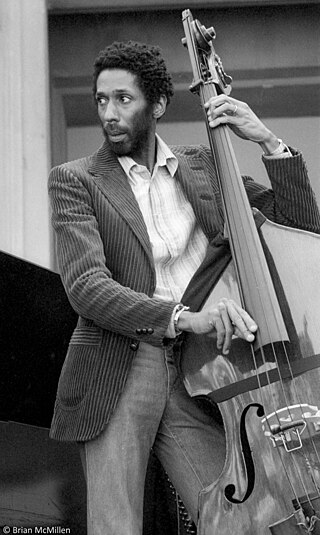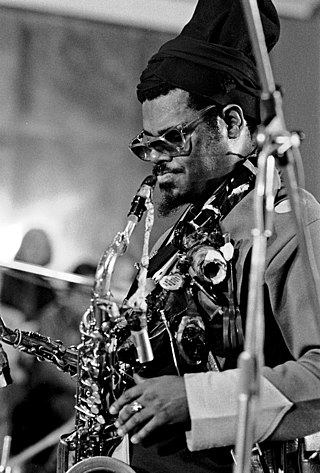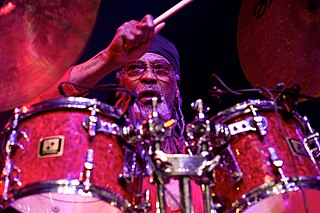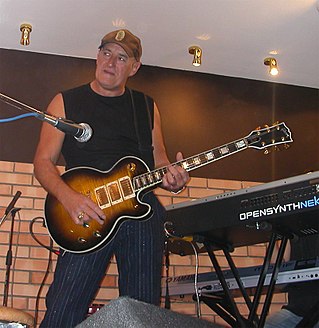
Ronald Levin Carter is an American jazz double bassist. His appearances on 2,221 recording sessions make him the most-recorded jazz bassist in history. He has won three Grammy Awards, and is also a cellist who has recorded numerous times on that instrument. In addition to a solo career of more than 60 years, Carter is well-known for playing on numerous iconic Blue Note albums in the 1960s, as well as being the anchor of trumpeter Miles Davis's "Second Great Quintet" from 1963-1968.

Rahsaan Roland Kirk, known earlier in his career simply as Roland Kirk, was an American jazz multi-instrumentalist who played tenor saxophone, flute, and many other instruments. He was renowned for his onstage vitality, during which virtuoso improvisation was accompanied by comic banter, political ranting, and the ability to play several instruments simultaneously.

Ronald Shannon Jackson was an American jazz drummer from Fort Worth, Texas. A pioneer of avant-garde jazz, free funk, and jazz fusion, he appeared on over 50 albums as a bandleader, sideman, arranger, and producer. Jackson and bassist Sirone are the only musicians to have performed and recorded with the three prime shapers of free jazz: pianist Cecil Taylor, and saxophonists Ornette Coleman and Albert Ayler.

Samuel Carthorne Rivers was an American jazz musician and composer. Though most famously a tenor saxophonist, he also performed on soprano saxophone, bass clarinet, flute, harmonica, piano and viola.

Jean-Luc Ponty is a French jazz and jazz fusion violinist and composer.

The music of Suriname is known for kaseko music, and for having an Indo-Caribbean tradition.

Jan Akkerman is a Dutch guitarist. He first found international commercial success with the band Focus, which he co-founded with Thijs van Leer. After leaving Focus, he continued as a solo musician, adding jazz fusion influences.

Thijs van Leer is a Dutch singer and keyboardist, best known as the founding member of the rock band Focus as its primary vocalist, keyboardist, and flautist. Born and raised in Amsterdam among a musical family, van Leer took up the piano and flute as a child and pursued them at university and music academies.
James W. Newton is an American jazz and classical flutist.
Makanda Ken McIntyre was an American jazz musician, composer and educator. In addition to his primary instrument, the alto saxophone, he played flute, bass clarinet, oboe, bassoon, double bass, drums, and piano.
William Overton Smith was an American clarinetist and composer. He worked extensively in modern classical music, third stream and jazz, and was perhaps best known for having played with pianist Dave Brubeck intermittently from the 1940s to the early 2000s. Smith frequently recorded jazz under the name Bill Smith, but his classical compositions are credited under the name William O. Smith.
Snijders is a Dutch occupational surname. Snijder literally means "cutter", referring to a taylor or a woodcarver. People with this surname include:

Surinamese culture has strong Asian, African and European influences. The population is mainly composed of the contribution of people from India, Africa, China, Europe, and Indonesia, as well as indigenous peoples who lived in the area, before the arrival of European settlers.

Benjamin Herman is a Dutch jazz musician. He is best known as an alto saxophonist and as leader of the jazz band New Cool Collective. Herman also plays the C-melody saxophone and flute. He also has a radio show on Radio 6 (Netherlands).
Julius Theodoor Hugo Uiterloo, better known by his stage-name Lieve Hugo and his nickname Iko, was a Surinamese singer. He was one of the pioneers of the kaseko-genre; hence his other nickname King of Kaseko.
Ewald Harold Krolis was a Surinamese kaseko-singer and percussionist.

Kawina, also spelled kawna or kauna, is a musical genre from Suriname. It originated in the last decades of the 19th century under the influence of the music and dance forms banya, laku and tuka. It is related to African music.
Kaseko is a musical genre from Suriname. It is a fusion of numerous popular and folk styles derived from Africa, Europe and the Americas.

Dance in Suriname is practiced from the amateur to the professional level for cultural, social and spiritual reasons, among others. Suriname has a variety of traditional and contemporary dance styles which have developed from the cultures of its ethnic groups. In addition, several foreign popular styles have been adopted from the West, the greater Caribbean, Java and Bollywood.

Richenel Edgar Snijders, commonly known as Eddy Snijders was a Surinamese composer, conductor, and flute player. He is considered as an innovator of Surinamese music, since he incorporated local traditions, including kaseko, to symphonic music. He made the arrangement of the Surinamese national anthem.











